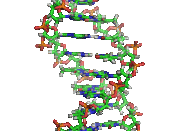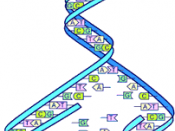Eight page paper outlining the Human Genome Project, a research study and project involving cloning of DNA for medical and research use. Written as an ethical issues paper from a nurse's standpoint. It includes the history of the project and uses today and in the future. Also includes potential ethical issues regarding cloning. Complete with references in APA format.
Running head: GENETICS, GENETIC RESEARCH AND CLONING
Genetics, Genetic Research and Cloning
The Human Genome Project
Melissa A. Buzbee
University of Wyoming
When James Watson won the Nobel Prize in Medicine in 1962 for discovering the structure of DNA, he opened up a whole new area of science and research that has led to great strides in medicine, as well as great controversy.
Beginning in the 1960's and 1970's, nearly all avenues of biomedical research have led to the gene, for genes containing the basic information about how a human body carries out its duties from conception until death (Collins, 1999).
As new technologies and advancements in understanding DNA were developed in the 1980's, it became clear that mapping DNA's sequences and the entire human genome was essential. With this realization a project entitled the Human Genome Project (HGP) was born.
The Human Genome Project officially began in 1990 under the leadership of the National Institute of Health (NIH) and the National Human Genome Research Institute (NHGRI). The goal of the HGP was to determine the location of all human genes and to read the entire set of genetic instructions encoded in human DNA (NHGRI, 2003). During the first half of the decade, the HGP primarily dedicated itself to developing genetic and physical maps pointing out precise locations of individuals' genes. By 1997, these studies had successfully sequenced approximately 2% of human DNA. This information was made readily available to...


